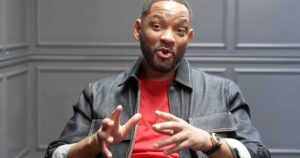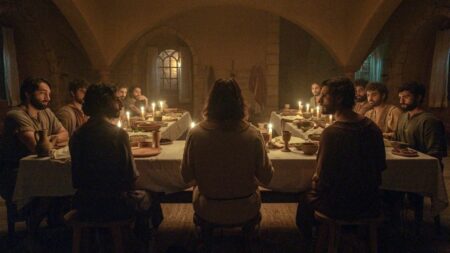The second season of “Sherlock & Daughter,” which is in competition this week at the Monte-Carlo Television Festival, still awaits greenlight, but not for the lack of ideas.
“They would just come popping out, and there were far too many for just eight episodes. If the fates are good to us, there are so many wonderful stories to be told with these characters,” says writer Shelly Goldstein at the festival.
Brendan Foley, writer and creator of the show, adds: “I think we’d like to take it international. At the end of the 19th century, society is moving from criminals robbing banks to criminals owning banks. Crime is blissfully international. I’d like to see what’s happening in the U.S., Europe, Australia at the same time. This great, glorious British Empire was still in its heyday, but it’s a big world out there.”
In the series, Sherlock Holmes (played by David Thewlis) becomes embroiled in a conspiracy involving the Red Thread criminal syndicate. To his own surprise, he joins forces with Amelia Rojas (played by Blu Hunt), a young Native American woman whose mother was recently murdered. And who claims Holmes is her father.
Taking on Arthur Conan Doyle’s character, one that just refuses to go away, was a “double-edged sword” for Foley.
“I don’t think anyone should do it lightly, because you have 20,000 different versions of Sherlock. There’s always a percentage of the audience who’d be absolute purists, and a percentage who haven’t read a word of [Conan Doyle] and knows Holmes from his 101 iterations. We’re appealing to quite a large audience, including a very mainstream U.S. audience who enjoys wrestling,” he jokes.
“A few people will always say: ‘Oh, you’ve ruined it.’ It’s always a good piece of advice not to read the comments, but we went from people saying: ‘I’m sure this will be terrible’ to ‘Well, it wasn’t too bad.’ That was a lovely thing, to see that evolution, but you can’t be all things to all people.”
Thewlis’ Sherlock is a “classic Sherlock,” but with a twist: “He’s a lion in winter. He’s older, grumpier, and then we’re able to play with the other side. Amelia lands in like a spunky meteorite, right into poor old Holmes’ tidy little world.”
She also forces him to experience something he hates the most: emotions.
“He’s a big experimenter, so is it possible that just once in his life he might have thought: ‘What’s all this human emotion stuff about? I’d better try it.’ And what if that went as badly as possible on that one occasion? Everyone has emotions. It may be hidden, but it’s there. We dig it out.”
Goldstein adds: “When you think of recent Sherlocks, they’re all kind of wonderful. Young, on the go, learning the ropes and breaking the rules. That’s not our Sherlock. He’s done it all. He’s done every case. He’s always 12 steps ahead of everybody else, but things are changing. Technology is changing, crime, class. It’s fun watching these little worlds collide while they’re trying to solve very, very intense crimes.”
The team decided that having a daughter, not a son, would be “harder for Sherlock.”
“It’s a big challenge. Amelia is very much her own woman; she’s got that American sensibility and comes from an extraordinarily different culture. She’s absolutely the last thing he would be prepared to deal with,” she notes.
But with many other new shows turning to Conan Doyle – including Monte-Carlo opener “Watson” – Sherlock fatigue is real.
“I was concerned,” admits Karine Martin, CEO at Starlings Entertainment, which produced the show with Albion Television, with Story First as a co-producer.
“There’s been so many great Sherlocks. But once the scripts started coming in, and once we saw our characters, we firmly felt this would really fill a space that hadn’t been taken yet. The idea of the father-daughter was something unusual to explore and then there’s the fact she’s Native American. We wanted to draw into that culture.”
According to Foley, “a Sherlock Holmes story can be a colossal turkey, a work of genius or anything in between.”
“It’s effectively a genre in its own right, an IP, a sort of Holmes-verse, if you like. You better get up early in the morning if you’re going to do it, unless you want to end up with a total misfire.”
“Conan Doyle, like most writers, was entirely unsentimental. I found a letter to him from someone who was doing a stage version in the 1920s, and he said: ‘Mr. Conan Doyle, would you think it was terrible if he fell in love and got married?’ He replied: ‘Murder him, marry him, do what you want with him!’ He was pretty open to new generations having different thoughts.”
Actors Fiona Glascott, playing Lady Violet Somerset, and Hunt were also at the fest.
“Being in Victorian England, that’s not something I thought I’d ever do. I’m always watching YouTube videos about ‘Why You Wouldn’t Survive in Victorian England.’ I love that period, even though this show is not pretending to be historically accurate,” says Hunt, who grew up on Robert Downey Jr.’s take on the famous character.
“But my favorite Sherlock is David’s, I’m not even kidding. I’m a huge Mike Leigh fan and he’s just one of the greatest actors. Without him, this show has no legs. He carries every single thing he’s in,” she praises the “studious, meticulous” lead, who memorized the whole script before the first table read.
Holmes is responsible for some archetypal male characters, she argues – even in other shows.
“Don Draper is like Sherlock Holmes, but in advertising. Tony Soprano is like Holmes, but he’s a gangster. This character that hates himself and struggles, has strange relationships with people and is too good at what he does.”
Instead of playing Amelia as a complete opposite to Sherlock, she wanted her to realize, at the end of the show, that she’s more like him than she’d like to admit.
“It makes her better, too.”
But her different background – and abilities – do come in handy sometimes.
“This American and Indigenous aspect, it opens [the show] up to the new audience. You see she has abilities and skills Sherlock wouldn’t have. She’s more outgoing and goes into conversations in ways he can’t. They play with it a lot in the show.”
Hunt used the money from the show to self-finance upcoming film “Replay,” which will see her act alongside fiancé Jason Lester.
“They say it’s something you shouldn’t do, but at this point, I wanted to tell a certain story and didn’t think anyone else would finance it. It’s a bit about my life coming off ‘The New Mutants,’ it’s very personal. I didn’t want anyone telling me what to do and what not to do.”
Featuring Peter Vack, it sees a couple going to Macedonia. After meeting an old co-star, “things get crazy and fucked up,” laughs Hunt, who also ended up editing the “very indie” film.
“I’ve been in a small room, in my sweatpants, for a year. So how did I get to Monaco?!”
Read the full article here








